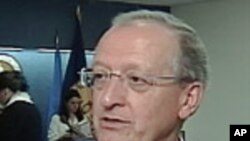Antonio Maria Costa, executive director of the United Nations Office on Drugs and Crime, says that in Afghanistan this year, opium poppy cultivation levels will be broadly similar too, perhaps slightly lower than, last year's record harvest. The sharp increases of recent years appear to be leveling off, he said, but the total amount of opium being harvested remains shockingly high.
During 2007, over one-hundred-ninety-thousand hectares were under poppy cultivation in Afghanistan, yielding an estimated nine-thousand tons of opium. Taxes on poppy growers have become an important source of funding for Taliban insurgents. This is a windfall for anti-government forces, further evidence of the dangerous link between opium and insurgency, said Mr. Costa.
<!-- IMAGE -->A recent U-N survey indicates that when given a chance, Afghan farmers will choose alternative crops to poppy. Of the four-hundred-sixty-nine Afghan villages visited by U-N officials, one-third had received agricultural assistance, including seeds. Almost two-thirds of those villages chose not to grow poppies.
We are seeing some positive trend, said U.S. Coordinator for Counter-narcotics and Justice Reform in Afghanistan Thomas Schweich. We think that the total amount of opium produced in Afghanistan will go down a little bit this year, he said. He said that Afghanistan's north and east will be almost poppy-free. But he cautioned, it will take many years to resolve the narcotics problem in Afghanistan.
<!-- IMAGE -->Kurt Volker, U.S. Principal Deputy Assistant Secretary of State for European and Eurasia Affairs says many nations have a direct interest in helping Afghanistan sort out its problems, including narcotics trafficking. Afghanistan is the number one supplier of opium and heroin to Europe, he said. As opium production has risen in Afghanistan, it increasingly impacts the young people of Europe, sowing addiction, disease, and death, and draining Europe's economic resources. To stop the flow of Afghan drugs, Deputy Assistant Secretary of State Volker said, we need to increase our efforts against the Taliban, and the drug-kingpins who support them, especially in the south.




